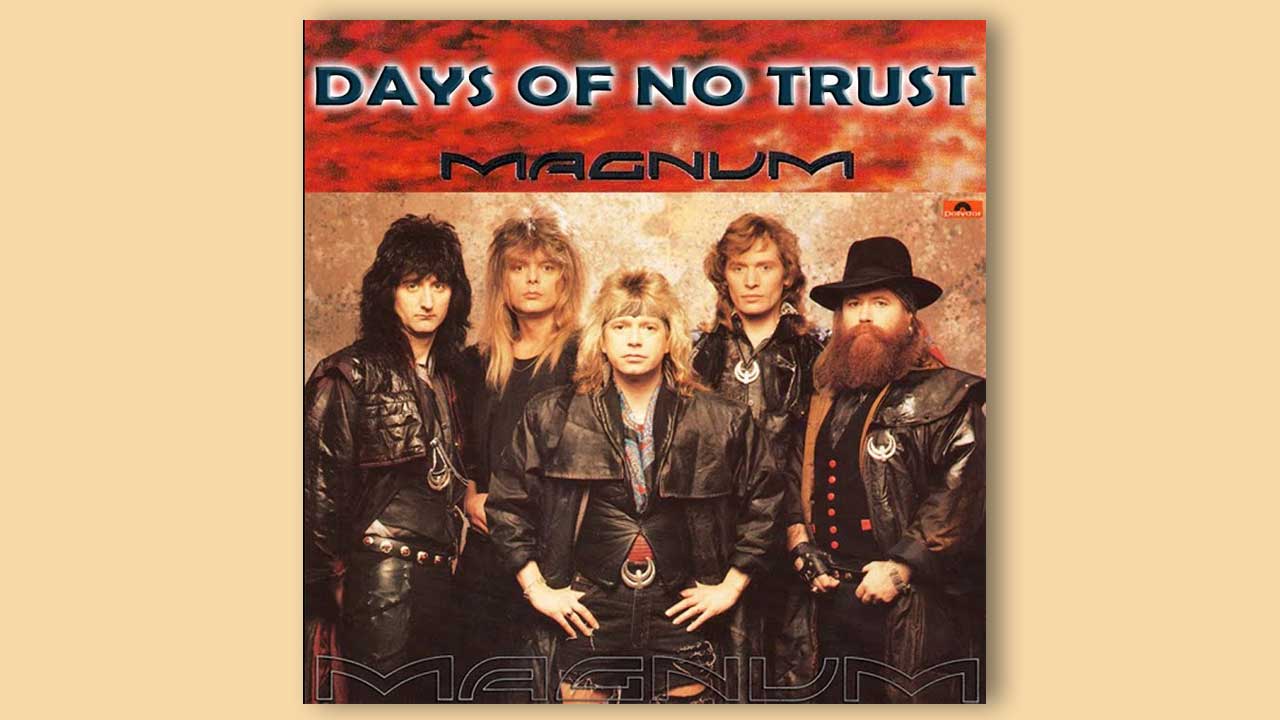In 1988, Magnum enjoyed their first Top 40 hit, Days Of No Trust. The opening track from the band's Wings Of Heaven album, it combined melodic grandeur – a hallmark of songwriter and band founder Tony Clarkin, whose death was announced yesterday – with hard-hitting lyrics about the state of the world.
"It's not meant to be a depressing song, nor a whole negative one," Clarkin wrote in the Wings Of Heaven tour programme. "But what I’m trying to say is that, for Christ's sake, we’re all fooling ourselves and we just carry on 'Living the same old lies'. We see on TV what goes on in the world and we never do anything about it, me included. I write a song about it… big deal!"
Days Of No Trust became a fan favourite, and was re-recorded by the band in 2021 and included in the limited, box set edition of the following year's album The Monster Roars.
In 2018, Tony Clarkin spoke with Louder's Paul Brannigan about how Days Of No Trust was written.

"We were in a good place going into the Wings Of Heaven album. Vigilante came out in 1986 and went Top 30 in the UK, and allowed us to do a lot of work across Europe. It felt like we had momentum. I remember seeing Marillion play the NEC in Birmingham, and I was probably wishing we could play in the same size of arenas. When Wings Of Heaven came out, we could.
"Writing songs is an obsession with me, I’m always looking to improve. Days Of No Trust might have been started at the end of the Vigilante sessions. There’s a certain cynicism to the lyric. I’m talking about how, for all the importance of music in our lives, it can’t put food on a table for a starving child, or bring back the hundreds of families that are murdered in global wars every week.
"It’s about putting music in perspective really. People can hear a well-intentioned song, and agree with the sentiments, but it’s not solving any real world problems or saving any lives. Obviously music has been my life, so I’m addressing myself in some ways too.
"Also it’s a dig at politicians, who might start off with a genuine desire to help, but end up acting in their own self-interests. There’s one lyric which says, 'Someone is shouting, revolution is here. He’ll climb any mountain for his selfish career.' The human race makes such a mess of everything."
"One of the lyrics was actually inspired by Marillion. We played with them at the Monsters Of Rock festival at Donington in 1985, and back then audiences used to throw all sorts of shit on-stage. I can remember Fish saying, “Stop throwing your brains on to the stage.” I doubt Fish would recall that, but the lyric “Pictures of plenty are stuck to the wall, For heads that are empty, brains on the floor” came from that memory.
"The single set up the album nicely. It was our first Top 40 single in the UK, and then Wings Of Heaven went Top 5. It made us pop stars, briefly! I enjoyed that level of fame to some extent, but we didn’t start this band to do Top Of The Pops or whatever. The success was more important to the record company than it was to us. After Wings Of Heaven they were saying, “You’re going to sell two million records next time!” and I’m thinking, “Who do you think we are?”
"It was crazy to me. Def Leppard and Whitesnake and Guns N’ Roses were selling tons of records, but we were nothing like those bands. Maybe I was stupid, but I always wanted Magnum to be an underground band, not a pop band. But we gradually got pushed further and further into those slots, which I didn’t like at all really.
"We don’t play Days Of No Trust at every gig. Bob [Catley] and myself try to put together a show that flows smoothly, and it doesn’t always fit the setlist. But it was a really significant song for us, and I think it’s a really good song. I listened to it again the other day actually, and I thought, this has all the elements which say, This is Magnum. I’m pleased that it stands up so well and means so much to so many."

